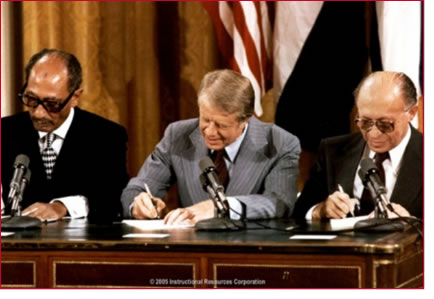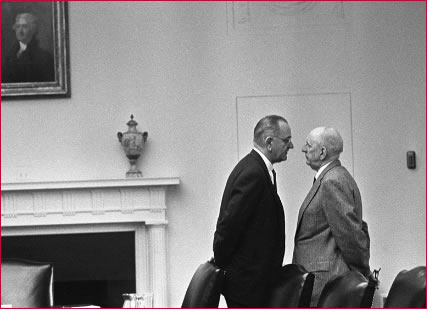The President
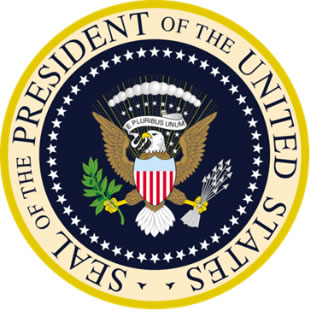
Presidential Seal of the United States of America.
Powers of the President
As time has passed, the roles, responsibilities, and powers of the President have grown as the roles and responsibilities of the federal government have grown. We have learned about the roles of the President outlined in the Constitution. Other roles have evolved over time and are now considered informal powers of the President and are not listed in the Constitution. The President of the United States is the most highly visible member of the federal government. No other member of the federal government draws the attention of the media as does the President. As a result, the presidency has been referred to as a "bully pulpit". It affords its occupant opportunities to bring about change in a way no other member of the government possesses.
Formal or Expressed Powers
Article II of the Constitution clearly states that the "executive power" shall be vested in the President. The Constitution does not define executive power, but it does give several powers to the President, including:
- Executive Power to head the executive departments, the Cabinet, and federal agencies to carry out the laws.
- Judicial Power to grant reprieves, pardons, or release from the official punishment of a federal offense, and amnesty, which is a general pardon for a group of offenders.
- Removal Power to remove, change, or fire appointees from their position with the exception of judges.
Expressed Powers
- Appointment Power to nominate people to serve as ambassadors, federal judges, federal department heads and other top positions.
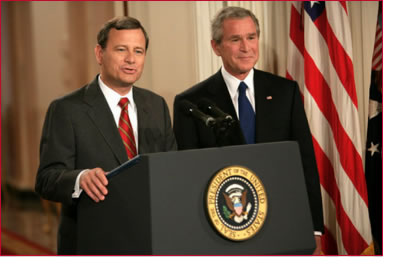
Supreme Court Justice nominee John Roberts, left, with President George Bush.
Formal or Expressed Powers
Military Power to command the army and navy as Commander in Chief including the power to take limited military action without a declaration of war by Congress.
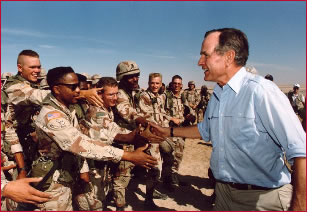
On Thanksgiving Day, 1990, President George H.W. Bush visited American troops in Saudi Arabia as part of Operation Desert Shield.
More Expressed Powers
- Legislative Power to convene Congress under "extraordinary" circumstances and to veto a bill passed by Congress.
- Legislative Power to recommend legislation and propose a budget to Congress in the State of the Union address or any other time.
- Diplomatic Power to make treaties with foreign governments (require Senate approval) and receive ambassadors.
- Diplomatic Recognition Power to formally identify or recognize the legal existence of a new country as a sovereign state.
More Expressed Powers
President Jimmy Carter, center, President Anwar Sadat of Egypt, left, and Prime Minister Menachem Begin of Israel sign the Camp David Accords in September 1978.
Inherent Powers
Article II of the Constitution requires the President to take an oath to "faithfully execute" the Office of President and "preserve, protect and defend the Constitution." Certain "Executive Powers" have been exercised by Presidents over the years to carry out their oath of office, especially in times of war and emergencies.
Inherent Powers
Executive Agreements are agreements the President has the power to make with the leaders of foreign governments that do not required the approval of the Senate.
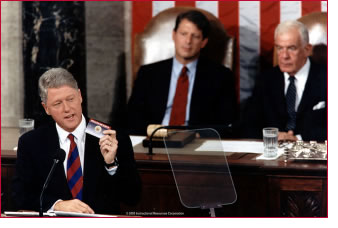
President Bill Clinton addresses Congress concerning support for the North American Free Trade Agreement, an agreement, or NAFTA, to lower trade barriers within the North American continent. NAFTA had been unsuccessfully sought by four previous presidents.
Inherent Powers
Executive Order is a formal directive issued by the President to other officials in the executive branch. An executive order cannot create a new law, but it can be used to clarify an existing law and has the force of a law.
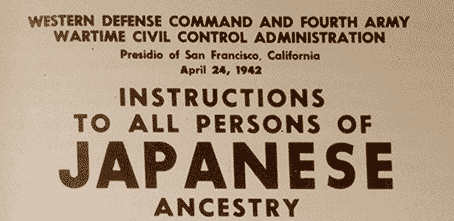
Inherent Powers
Executive Privilege is a power that allows the President to refuse to appear before, or to withhold information from, the other two branches in order to keep information confidential in the interest of national security.
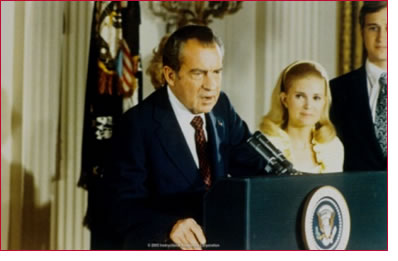
President Richard Nixon announces his resignation from the presidency on August 9, 1974. During the Watergate scandal, Nixon invoked executive privilege to avoid turning over tapes that might have revealed a cover-up.
Informal Powers of the President
Presidential power has grown significantly throughout our nation's history primarily in the area of informal powers that are not specifically mentioned in the Constitution. The position of party leader and media access are two of the main sources of the growth of Presidential power that was impossible for the Framers of the Constitution predict.
As head of party, the President helps set the political agenda for his or her party. The President works hard to maintain unified support in Congress for the agenda. In exchange for congressional support, party members expect campaign support from the President during elections. Support and power depend on approval ratings. The more popular a President is, the more effective his or her support can be to party members.
Bully Pulpit
In addition to being party leader, the President is in a better position than perhaps anyone in the nation to push an agenda. Theodore Roosevelt described it best when he coined the term bully pulpit referring to the position of the White House as a superb platform. The expression "bully" meant something wonderful or good at the time; it was not used negatively as it is today. The presidency, as a "bully pulpit," affords its occupant opportunities to bring about change in a way no other member of the government possesses.
Bully Pulpit
President Johnson endeavors to give "The Treatment" to Senator Richard Russell in 1963, standing face-to-face and almost nose-to-nose.
Total Media Access
The President of the United States is the most highly visible member of the federal government. No other member of the federal government draws the attention of the media as does the President. Franklin Roosevelt, the most influential president of the 20th century, practically invented media politics with his press conferences and radio addresses. He had 1,000 press conferences during his twelve years in the White House.
Total Media Access
Twenty-four hour media access has given modern presidents a great deal of power. The President can call a press conference at any time to present his or her agenda and influence public opinion. Today Presidents have media experts on staff whose job is to shape their message and help them to present it effectively to the people.
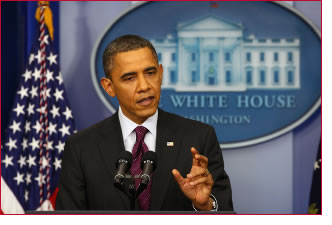
President Barak Obama addresses the press from the White House.
State of the Union Address
One of the most effective means of addressing Congress and the American people as a captie audience is the President's State of the Union Address. The State of the Union Address is a yearly report given by the President to Congress that is required by the Constitution. Every president from Thomas Jefferson to William Howard Taft submitted a written report to Congress. Woodrow Wilson resumed George Washington's tradition of making a speech in a joint session of Congress. The State of the Union Address is telecast by all the major the major networks, providing the President with a captive audience.
State of the Union Address
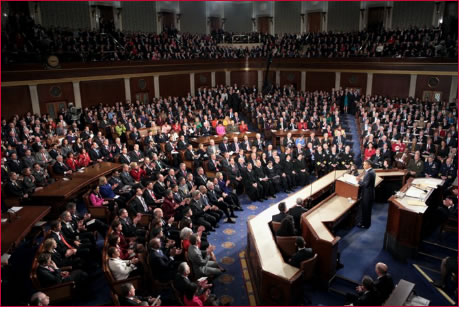
President Barak Obama delivers his State of the Union Address to Congress in 2011.
Checks and Balances by the Executive Branch
The system of checks and balances outlined in our Constitution gives the President the power to check the other two branches government. The President checks the legislative branch via the power to veto bills, recommend legislation, and call special sessions of Congress. The President checks the judicial branch via the power to appoint judges and the power to grant reprieves and pardons.
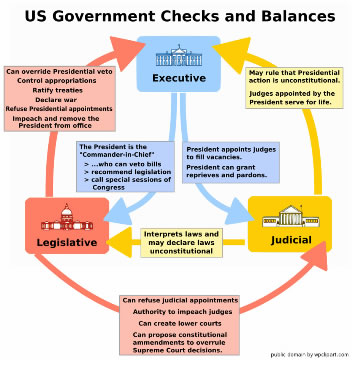
A flow chart depicting the system of checks and balances between the three branches of government. The arrows flow from each branch describing the powers to check the other branches.
Checks and Balances on the Executive Branch
The system of checks and balances outlined in our Constitution also allows Congress and the Supreme Court to check the power of the Executive Branch. The Supreme Court has the power to rule that a Presidential action is unconstitutional. In addition, Congress has several ways to check the President including the power to: override a veto, ratify treaties, refuse presidential appointments, declare war, control appropriations, and even impeach and remove the President from office.
